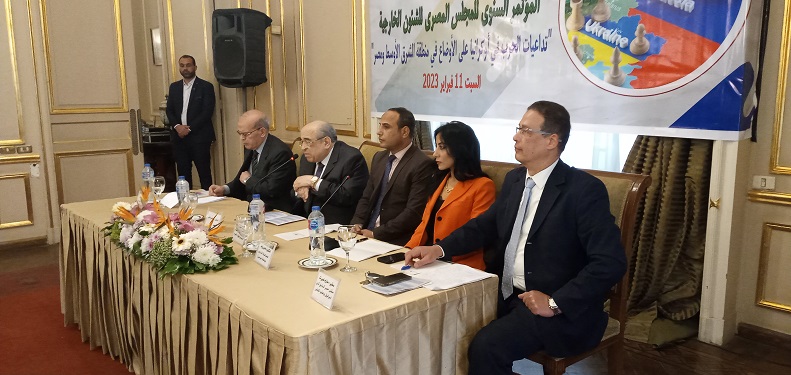Participation of Ambassador Sayed Abu Zeid in a symposium on “Indonesia and Peace in the Middle East”
December 18, 2019Meeting with Syrian Democratic Council (SDC) Official Sihanouk Dibo
December 30, 2019
The Egyptian Council for Foreign Affairs (ECFA) convened its annual conference under the slogan of “Middle East Security…Opportunities and Challenges,” over two days; December 23rd and 24th , 2019. An elite group of academics, ambassadors, researchers, and those interested in issues of the region and the world, attended and participated in the works of the conference. H.E. Minister of Foreign Affairs, Mr. Sameh Shokry, opened the works of the conference by a speech addressing the strategic objectives within the Government’s Action Program for protection of Egypt’s national security and foreign policy in consistency with the presidential mandate to move from the state stabilization phase to the phase of reaping the benefits, emerging from the fact that Egypt is a regional power that works for achieving the common interests of the region or the continent and defending them in accordance with principles of international law and multilateral frameworks, thereby enhancing cooperation among states within a framework of equality and mutual respect as well as achieving common interests, and upholding the role of national state and its institutions as a guarantee to achieving the objectives of reform and development in accordance with the vision and will of peoples and not according to the priorities and interests of external parties.
In addition to its opening and closing sessions, the conference held four sessions, each one of them addressing a theme; the first one focused on the internal determiners for Middle East security, the second one addressed the economic, political, and legal aspects of East Mediterranean gas, while the third theme focused on regional visions for Middle East security, and finally, the fourth theme addressed international visions for security of the region.
Other than tackling various aspects of the topics dealt with in the discussions as well as recommending the steps that must be taken towards current situations in the region, during the four sessions; the international agenda for combating terrorism in the region was also touched upon at the conclusion of the fourth session.
As it has serious influence over Middle East Security and over the development of its states.
In this context, the conference emphasized the need for enhancing collective effort in order to combat terrorism, especially with the growth and spread of this phenomenon due to the selective approach of western states in this regard by being satisfied with confronting ISIS and Al-Qaeda while letting the Muslim Brotherhood free, as well as the support given by some states to political Islam under the claim of protection of democracy and human rights. It was also pointed out that setting a specific definition for terrorism is still controversial. Furthermore, some western states are still promoting many misleading terms with the aim of giving legitimacy to some of them; thus, the western approach is still characterized by double standards. The conference has condemned the continued harboring of terrorists by some states of the region and allowing them gain access to media platforms for disseminating radical ideology and incitement to terrorism, which constitutes a flagrant violation of pertinent UN resolutions. Moreover, some states still favor political interests over combating terrorism; a fact reflected by situations in Syria and Libya where terrorist organizations are active over there.
The conference was concluded in this regard by emphasizing the necessity of adopting a comprehensive approach for combating terrorism that extends beyond security aspects to include economic, social, cultural, educational, and developmental dimensions.






